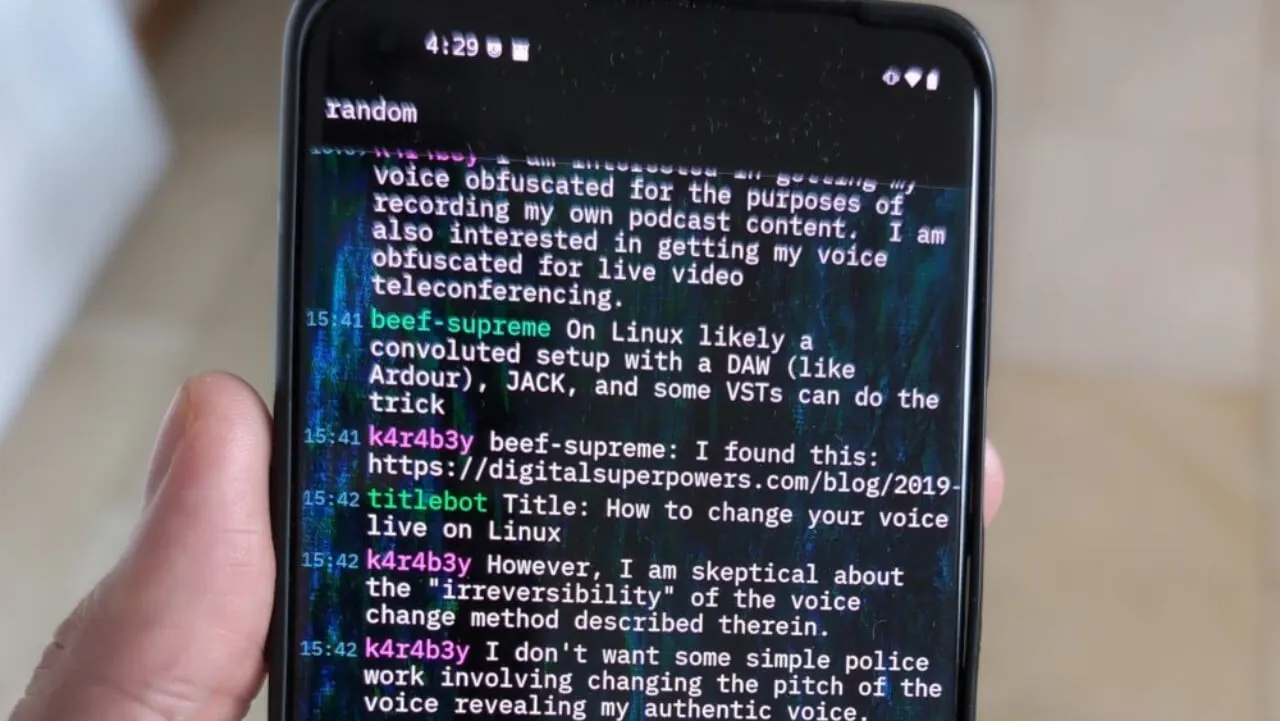DarkIRC Anonymous Chat Aims to Counter ‘Brutal Censorship of Crypto Devs’

The new anonymous messaging platform from DarkFi bills itself as a highly secure channel for private communication.
A new messaging service billed as “the world's strongest anonymous chat” has launched in pre-alpha.
DarkIRC was created in response to “the brutal censorship of crypto devs by authoritarian regimes,” developer Amir Taaki said in a tweet.
The chat service is designed to allow users to communicate without identity tracking. Unlike traditional messaging platforms that require user registration or generate persistent identifiers, DarkIRC enables users to change their nicknames at any time.
“Free society means free speech,” Taaki went on. “That means all speech. Without limits."
DarkIRC is designed to allow users to communicate without identity tracking. Unlike traditional messaging platforms that require user registration or generate persistent identifiers, DarkIRC enables users to change their nicknames at any time.
Messages transmitted are not linked to any persistent identity, allowing for plausible deniability that any message could have been sent by a given user in the event of an investigation.
Taaki explained that the software was created in response to the “attack” on developers working on “freedom tech,” such as crypto mixer Tornado Cash.
“The power regime puts devs who work on freedom tech in jail,” the DarkIRC developer said, adding that, “We are under attack. Devs are pushed into secret spaces with their back against the wall."
He pointed to the case of Roman Storm and Alexey Pertsev, the developers of coin mixer Tornado Cash, which was sanctioned by the U.S. Treasury in 2022.
Pertsev was convicted of money laundering charges by a Dutch court in May this year, receiving a 64-month prison sentence. Storm faces money laundering charges in the U.S., where last month, a U.S. district judge ruled that his case in the Southern District of New York could proceed to trial.
In his tweet, Taaki claimed that, “During the Tornado Cash case, prosecutors got their internal chats on Signal. The court went "you said this" and put the devs in jail.” Decrypt has reached out to messaging app Signal and will update this story should they respond.
Tornado Cash is a decentralized and trustless mixer, meaning that developers deployed it without having any control over who uses it and how. Imprisoning developers over others misusing software that they do not control has attracted the attention—and ire—of privacy activists who claim it sets a dangerous precedent and impinges on freedom of speech.
Rachel Rose O'Leary, a developer at DarkFi, the organization behind DarkIRC, explained that while the team ensured that there are methods for anonymous collaboration, some team members’ identities such as hers are not a secret. “We're aware that this is a risk, it's a calculated one,” she said.
“There's a war on privacy and there's a war on privacy developers,” O’Leary said, adding that, “We're taking this risk, this is bigger than us.”
Taaki also highlighted recent changes to messaging app Telegram’s privacy policies, stating that, “The EU has forced Telegram to hand over all chat data to them. This is the new normal.”
In September, following the arrest of its CEO Pavel Durov in France, Telegram adjusted its privacy settings to allow for greater data sharing with government authorities. Telegram's CEO, Pavel Durov, announced that the app would now disclose suspected criminals' IP addresses and phone numbers upon receiving valid court orders from relevant judicial authorities.
These policy adjustments have sparked debates about balancing user privacy and security, with critics arguing that Telegram’s expanded data-sharing capabilities could lead to increased surveillance and reduced user anonymity.
DarkIRC's peer-to-peer IRC implementation allows for the usage of the Tor network to further enhance anonymity, making it difficult for third parties to trace communications back to individual users. The platform also incorporates measures to prevent spam and flooding, allowing each channel to set its posting policies and enabling users to enable optional moderation.
Recent reports suggested that Tor has been compromised, with German law enforcement being able to deanonymize users of a messaging platform operating through the network. Investigators correlated the timing patterns of traffic entering and exiting the Tor network alongside broad and long-term monitoring of Tor nodes in data centers.
The method employed by German police does not work when the user connects to onion sites. Those services operate entirely within the Tor network and do not require the usage of exit nodes.
The Tor Foundation investigated the claims and concluded that the deanonymized user employed an outdated version of the instant messaging software Ricochet. The version being outdated is relevant because it did not use the Vanguards-lite or the Vanguards add-on—either of which would have prevented this kind of attack.
For this reason, both Tor’s investigation and an independent report later published by cybersecurity firm Malwarebytes stated that Tor is “still safe to use.”
Nevertheless, O'Leary highlighted that DarkIRC’s development team plans to add support for more network-level anonymity solutions such as Nym, a privacy-preserving mixnet leveraging zero knowledge (ZK) proofs.
Related News
- Bitcoin Price Ticks Up Ahead of U.S. Jobs Report as Sell-Off ‘Nearing its End’
- SEC, DOJ Back Class Action Against Nvidia Over Alleged Hidden Crypto Revenue
- Binance’s Market Dominance Slips to Lowest Point in Four Years Amid Regulatory Headwinds
- Ripple Expands Latin American Reach With Payments Launch in Brazil via Mercado Bitcoin
- Ethereum Game 'Moonray' Expanding to Mobile With New Auto-Battler
- What’s Driving Gary Gensler’s Crypto Agenda? ‘He’s Got Some of That Elizabeth Warren in Him’, Says Mark Cuban
- Grayscale Launches Aave Fund for Ethereum Lending Token
- Mark Cuban Still Loves Dogecoin But ‘Every Meme Coin Is a Rug Pull in the Works’
- Lucky Meme Coin Trader Turns $140 Into $450,000 in 24 Hours
- Congressman Blames Crypto Apathy for Slow US Response to Jailed Binance Exec
© 2025 DeFi.io